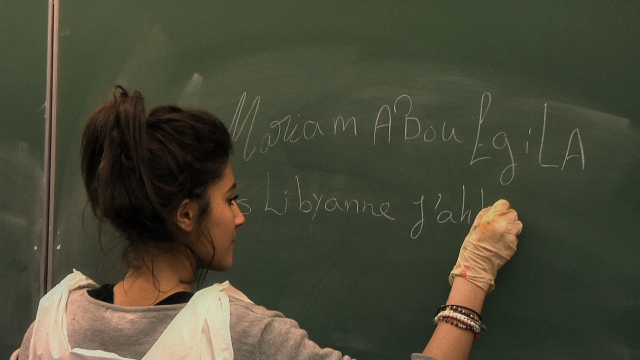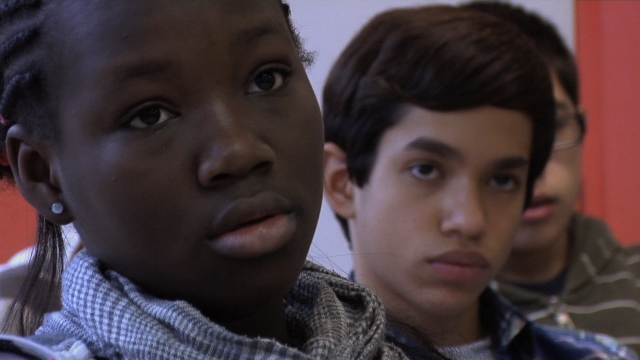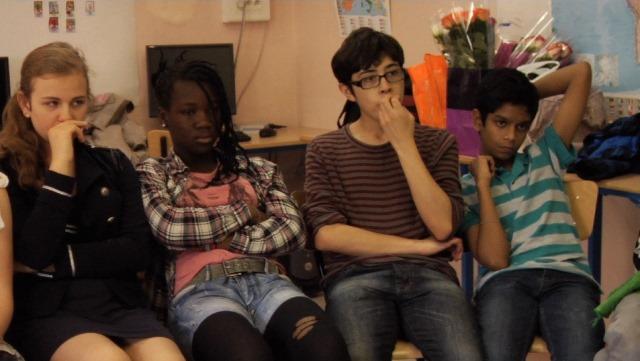“God isn’t in this class, we’ll leave God outside.” Although teacher Brigitte Cervoni declares that matters of religion are not appropriate for her class of non-French children learning the language of their new country, a lengthy section of School of Babel nonetheless finds them debating Adam and Eve and the differences between faiths. It’s not the only disconnect in director Julie Bertuccelli’s documentary.
Despite chronicling a year of a group of immigrant children in the French school system, School of Babel (La Cour de Babel) is not about the politics of France’s attitude to immigrants or the economic effects of immigration. Instead, it is more modest and consequently more touching: the story of the children in the class learning a new language is subservient to their own stories. None of this is to say that School of Babel is unsatisfying, but more that it paints a hermetic picture of this class of 11- to 15-year-olds, their teacher and their parents.
 School of Babel was made at the Collège de la Grange aux Belles in Paris’ north-eastern, but still-central, Xth arrondissement – the district accommodating the Eurostar terminal at Gare du Nord. A mixed quarter, it’s experienced an encroaching level of hipsterisation and rising property prices, especially around the Canal Saint-Martin. But the nature of the school’s catchment area and context are not apparent in the film.
School of Babel was made at the Collège de la Grange aux Belles in Paris’ north-eastern, but still-central, Xth arrondissement – the district accommodating the Eurostar terminal at Gare du Nord. A mixed quarter, it’s experienced an encroaching level of hipsterisation and rising property prices, especially around the Canal Saint-Martin. But the nature of the school’s catchment area and context are not apparent in the film.
The 24 pupils Bertuccelli trains her camera on are from 20 countries (the credits give the United Kingdom and Northern Ireland as separate nations). There is Mali and Poland, Belarus and Chile, Morocco and Sri Lanka, and Guinea and Romania. Cervoni’s group is termed the “reception class”: a class specially for new immigrant entrants in the school system and tasked with teaching them French. This is not a programme Nigel Farage would support and, as such, the film is an ad for the openness of the French education system. When the kids are deemed sufficiently skilled, they move on into day-to-day schooling. There is no inkling of the rest of the school’s views on this class apart.
It is just as well then, with the film’s narrow focus, that Cervoni is extraordinary and that her charges brim with character. Even the often-silent yet warm Chinese girl Xin radiates a solemn understanding of the tough task ahead of her. The sometimes disruptive Rama, from Mauritania, is gently labelled “lively” by Cervoni. The teacher herself is even-handed, patient and prods and pushes with a mild assertiveness. Grammar is routinely corrected, but never in a way which chastises. Despite always wanting to progress the class in the task at hand, Cervoni is also non-judgemental and understanding.
 She is seen with pupils and parents in face-to-face meetings. There, we learn Xin cannot practice French at home as her mother is working all hours. She is on her own, at home alone in silence. Luca, from Northern Ireland, is said by his mother to have been diagnosed with Asperger’s. Cervoni simply takes this on board as part of the whole picture.
She is seen with pupils and parents in face-to-face meetings. There, we learn Xin cannot practice French at home as her mother is working all hours. She is on her own, at home alone in silence. Luca, from Northern Ireland, is said by his mother to have been diagnosed with Asperger’s. Cervoni simply takes this on board as part of the whole picture.
Some of the details of these meetings are harder to pass by. Rama was regularly beaten before her arrival in France and may be sent back to Africa if she fails to meet standards in school. Similarly, if school doesn’t work out for Djenabou she could also be sent back to Guinea and subjected to female genital mutilation. Neither girl would receive any schooling if returned to Africa.
And learn they do in Paris, even the harder-to-deal-with kids. A film made by the class on the theme of difference picks up prizes in two competitions. They bond with Cervoni and each other. As the school year comes to end all are in tears.
Bertuccelli is an assured director responsible for a string of fine films – mostly documentary but fiction too (notably 2003’s Since Otar Left, where immigration was also a theme). But despite its winning cast, School of Babel is unlikely to have the impact of the other recent internationally feted school-set French films Etre et avoir (2002) and The Class (2008). Not because they have stolen a march on Bertuccelli, but because the undoubtedly sensitive School of Babel defines its remit so narrowly.
Overleaf: watch the trailer for School of Babel
Watch the trailer for School of Babel















Add comment